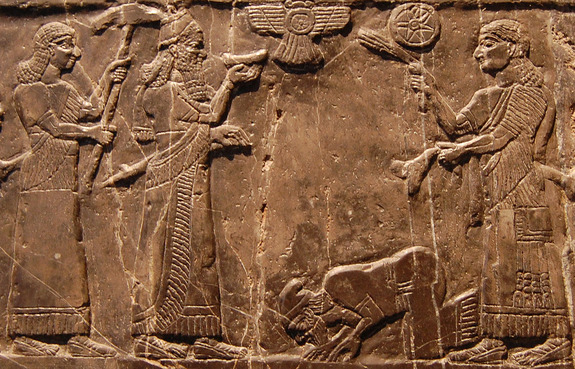The erosion of Jewish literacy among today’s secular & non-Orthodox Jews, establishment organizations, academics, and intellectuals.

King Jehu of Israel, Black Obelisk of Shalmaneser III, second half of ninth century B.C.E.
by Matthew M. Hausman
There’s an apocryphal story about Leyzer Zamenhof, the inventor of Esperanto – an artificial language created with the utopian aim of promoting global harmony through linguistic uniformity. As the story goes, Zamenhof gave the opening address at the first international conference of Esperanto speakers and, wishing to welcome his audience as warmly as possible, he gave the most universal greeting he could think of: “Vos makht a Yid?” As a Jew from Bialystok, Zamenhof spoke Yiddish and Hebrew (as well as German, French, Polish, and Belarusian); and mythical though the story may be, it illustrates how prior generations maintained both their Jewish heritage and cultural literacy. Even the original proponents of the Haskalah (“Enlightenment”) sought to work within a Jewish cultural framework while they discouraged ritual observance and clashed with the religious establishment.
Zamenhof’s story evokes a time when, regardless of observance level, a Jew’s worldview was shaped by knowledge of Tanakh, rabbinic literature, Hebrew language, and Jewish culture and history. And it remains relevant because it contrasts with the erosion of Jewish literacy among today’s secular and non-Orthodox Jews, communal establishment organizations, and lettered professionals, academics, and intellectuals.
As an adjunct professor of criminal justice at a local college (one of several hats I wear), I use text materials suggested or approved by my department, but they sometimes contain material troubling from a Jewish perspective. The authors all have advanced degrees and are experts in their fields; and those with Jewish names sometimes include Jewish reference points in their works. I often find the use of Judaic subject matter in this way perfunctory, however, illustrating that secular academic achievement does not correlate with Jewish literacy. In fact, religious or moral insights inserted into course materials often seem to track the secular ideologies prevalent on university campuses today, while references to traditional sources show limited understanding of sacred text.
This is especially apparent in books and class materials discussing the evolution of the criminal justice system from its roots in the concept of lex talionis to its modern emphasis on rehabilitation. One common thesis holds that criminal justice in its earliest form was primarily retributive (which it was), and by way of example equates the ancient Code of Hammurabi with the dictum of “an Eye for an Eye” from the Torah (Shemot 21:24-26). Despite the supposed similarities, however, there are fundamental differences between Babylonian law and the Torah; and relating the two suggests a lack of scriptural understanding…
CONTINUE READING at https://www.israelnationalnews.com/news/356069
- Like
- Digg
- Del
- Tumblr
- VKontakte
- Buffer
- Love This
- Odnoklassniki
- Meneame
- Blogger
- Amazon
- Yahoo Mail
- Gmail
- AOL
- Newsvine
- HackerNews
- Evernote
- MySpace
- Mail.ru
- Viadeo
- Line
- Comments
- Yummly
- SMS
- Viber
- Telegram
- Subscribe
- Skype
- Facebook Messenger
- Kakao
- LiveJournal
- Yammer
- Edgar
- Fintel
- Mix
- Instapaper
- Copy Link









